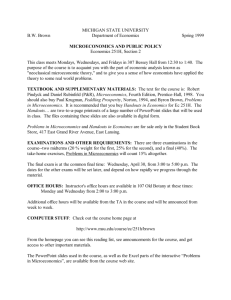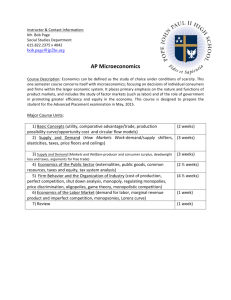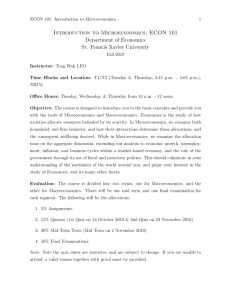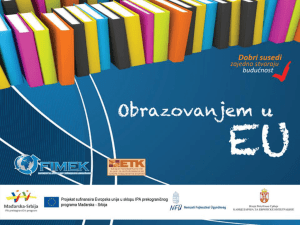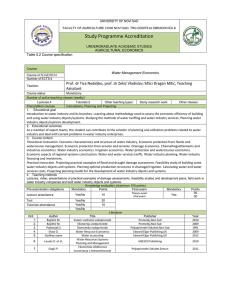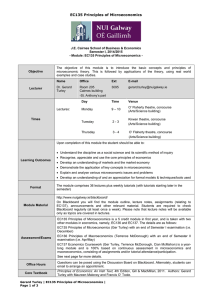UNIVERSITY OF NOVI SAD FACULTY OF AGRICULTURE 21000
advertisement
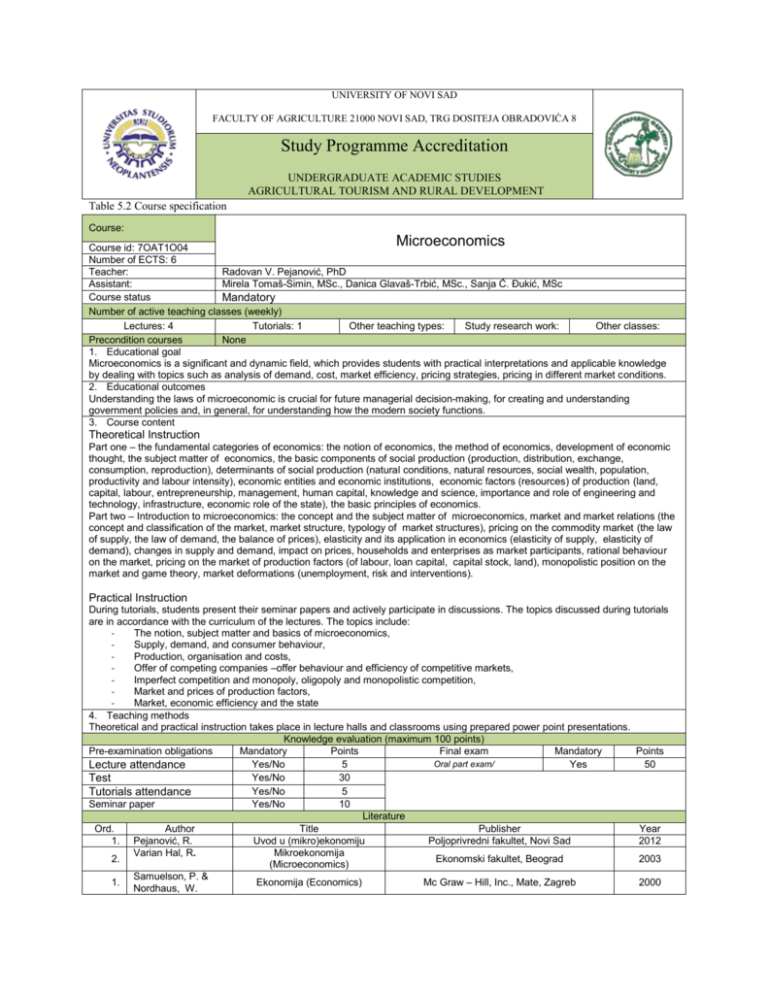
UNIVERSITY OF NOVI SAD FACULTY OF AGRICULTURE 21000 NOVI SAD, TRG DOSITEJA OBRADOVIĆA 8 Study Programme Accreditation UNDERGRADUATE ACADEMIC STUDIES AGRICULTURAL TOURISM AND RURAL DEVELOPMENT Table 5.2 Course specification Course: Microeconomics Course id: 7ОАТ1О04 Number of ECTS: 6 Teacher: Radovan V. Pejanović, PhD Assistant: Mirela Tomaš-Simin, MSc., Danica Glavaš-Trbić, MSc., Sanja Č. Đukić, MSc Course status Mandatory Number of active teaching classes (weekly) Lectures: 4 Tutorials: 1 Other teaching types: Study research work: Other classes: Precondition courses None 1. Educational goal Microeconomics is a significant and dynamic field, which provides students with practical interpretations and applicable knowledge by dealing with topics such as analysis of demand, cost, market efficiency, pricing strategies, pricing in different market conditions. 2. Educational outcomes Understanding the laws of microeconomic is crucial for future managerial decision-making, for creating and understanding government policies and, in general, for understanding how the modern society functions. 3. Course content Theoretical Instruction Part one – the fundamental categories of economics: the notion of economics, the method of economics, development of economic thought, the subject matter of economics, the basic components of social production (production, distribution, exchange, consumption, reproduction), determinants of social production (natural conditions, natural resources, social wealth, population, productivity and labour intensity), economic entities and economic institutions, economic factors (resources) of production (land, capital, labour, entrepreneurship, management, human capital, knowledge and science, importance and role of engineering and technology, infrastructure, economic role of the state), the basic principles of economics. Part two – Introduction to microeconomics: the concept and the subject matter of microeconomics, market and market relations (the concept and classification of the market, market structure, typology of market structures), pricing on the commodity market (the law of supply, the law of demand, the balance of prices), elasticity and its application in economics (elasticity of supply, elasticity of demand), changes in supply and demand, impact on prices, households and enterprises as market participants, rational behaviour on the market, pricing on the market of production factors (of labour, loan capital, capital stock, land), monopolistic position on the market and game theory, market deformations (unemployment, risk and interventions). Practical Instruction During tutorials, students present their seminar papers and actively participate in discussions. The topics discussed during tutorials are in accordance with the curriculum of the lectures. The topics include: The notion, subject matter and basics of microeconomics, Supply, demand, and consumer behaviour, Production, organisation and costs, Offer of competing companies –offer behaviour and efficiency of competitive markets, Imperfect competition and monopoly, oligopoly and monopolistic competition, Market and prices of production factors, Market, economic efficiency and the state 4. Teaching methods Theoretical and practical instruction takes place in lecture halls and classrooms using prepared power point presentations. Knowledge evaluation (maximum 100 points) Pre-examination obligations Mandatory Points Final exam Mandatory Points Oral part exam/ Yes/No 5 Yes 50 Lecture attendance Yes/No 30 Test Yes/No 5 Tutorials attendance Seminar paper Yes/No 10 Literature Ord. Author Title Publisher Year 1. Pejanović, R. Uvod u (mikro)ekonomiju Poljoprivredni fakultet, Novi Sad 2012 Varian Hal, R. Mikroekonomija 2. Ekonomski fakultet, Beograd 2003 (Microeconomics) Samuelson, P. & 1. Ekonomija (Economics) Mc Graw – Hill, Inc., Mate, Zagreb 2000 Nordhaus, W.




